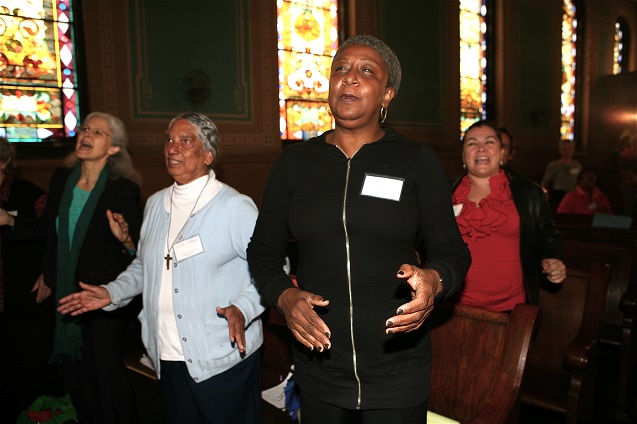
“Poverty is the new normal” according to former Green Party presidential candidate Jill Stein, speaking in Philadelphia in October 2013 in her role as juror for the World Court of Women on Poverty in the United States. Stein leads the “Green Shadow Cabinet,” which aims to provide an “alternative voice to the dysfunctional government in Washington DC.” Her participation in the court aimed to inform her administration’s understanding of how the economy and our nation’s social policies are affecting people and communities.
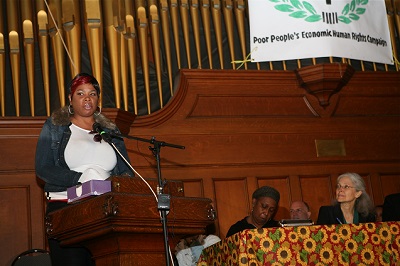
The World Courts of Women are people’s tribunals that call to account the economic and political systems responsible for the violence and suffering in the lives of so many women and other vulnerable groups. Whereas typical courts of law focus on individual offenders, deflecting attention from the underlying social structures that cause violence, these courts provide a “safe space” for victims of social injustice to share their stories and connect with others. The ultimate aim of the courts is social transformation through truth-telling, healing and building collective visions and strategies.
The performance of the WCW in Philadelphia, the “birthplace of freedom” according to history books, highlighted the contradictions between this country’s symbols and values and the lived experiences of poor people. It also underscored the failures of our judicial system, which remains blind to the senseless violence and suffering plaguing communities around the country.
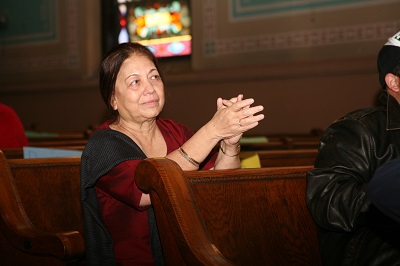
The WCW dispelled any notion that this country values equality. The stories witnesses told of their struggles to keep their homes, get essential health care and to escape violent situations revealed a system that is, at best, indifferent to human suffering. That a fictitious court was needed to bring to light the large-scale violence seen in poor communities around the United States signals a tremendous institutional failing.
Witnesses provided story upon story of dashed “American dreams.” Many gave accounts of how their families’ lives were impacted by lack of access to housing, including foreclosures. Some lost their homes because of mental or physical illness that prevented them from working. Several witnesses had been living comfortable middle-class lives before some “life-changing event” led them to lose their jobs, savings and homes.
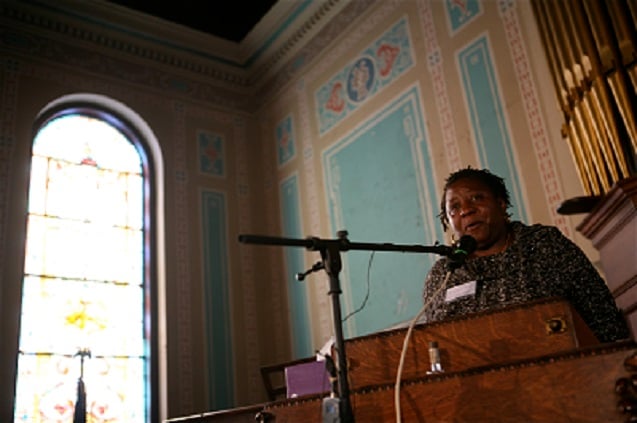
Some held multiple jobs and still lived paycheck to paycheck. One woman spoke of the betrayal she felt when, after finishing high school, the promise of a job proved unattainable. The lack of jobs “is the experience of my generation.” Without fail, witnesses charged the public welfare system with cruelty and ineptitude. They found themselves degraded and disrespected by agency workers who constantly questioned their integrity. One is not supposed to be poor in America.
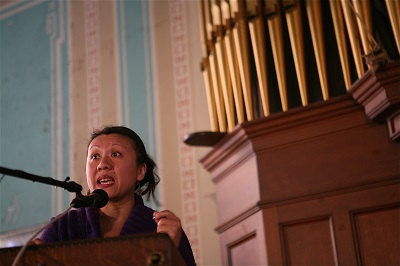
The Miss Camden New Jersey Teen Pageant team shared their stories of struggle, survival and hope. Coming from a city that ranks first in per capita violent crime1, these young leaders discussed their issue platforms. They addressed education cuts, gun violence, obesity, bullying, drug abuse – concerns that affect their lives directly.
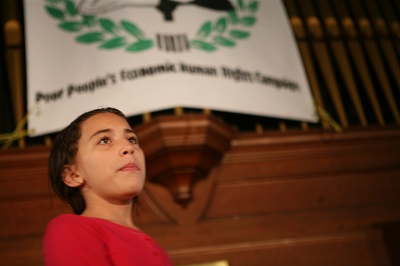
Indicting the System
The clear take-away message was that the militarism and market-ideology that drives our political and economic system is guilty of causing vast suffering in our communities. Women, youths, poor people, people of color, the infirm and houseless are sounding the alarm. Despite the wake-up call of the economic crisis of 2008, political leaders repeatedly have emphasized money and greed over people’s livelihoods. The evidence lies in policies such as:
– Building prisons while closing schools.
– Spending billions to bail out corporations while cutting basic support for unemployed workers and families.
– Supporting destructive industries such as fracking and casinos2 whose growth requires environmental destruction and social dysfunction.
– Refusing to create a public health system that serves the needs of all residents.
– Maintaining and expanding military engagements around the world.
WCW participants claimed that these policies impose unemployment, social exclusion and misery on growing numbers of American families, making poverty “the new normal.”
No more “being doormats”
Juror Jill Stein quoted Alice Walker, saying “the most common way people give up their power is by thinking they don’t have any.” For many participants, the decision to take the witness stand represented a shift in consciousness and a courageous grasp for new-found power. They are done being “professional victims,” and are committed to working to build collective power. Thus, rather than closing the WCW with a customary verdict and sentencing, they engaged in another full day of work to build networks and strategies for transforming the system.
Organizers discussed work in the United States Social Forum and its People’s Movement Assemblies to build social movements and advance social transformation in the United States and to connect peoples struggles around the world. The presence of this established organizational framework and networks generated real confidence that this weekend’s work would bear fruit. Participants left with a strengthened and expanded set of political relationships and a renewed focus and commitment to rolling up their sleeves to movement building.
1 Comparison is cities over 50,000 residents.
2 Casinos generate annual revenues of $3 billion, and are a leading industry in some states. Court witnesses claimed that these industries foster addictions and broken families and divert resources from socially productive uses.
Angry, shocked, overwhelmed? Take action: Support independent media.
We’ve borne witness to a chaotic first few months in Trump’s presidency.
Over the last months, each executive order has delivered shock and bewilderment — a core part of a strategy to make the right-wing turn feel inevitable and overwhelming. But, as organizer Sandra Avalos implored us to remember in Truthout last November, “Together, we are more powerful than Trump.”
Indeed, the Trump administration is pushing through executive orders, but — as we’ve reported at Truthout — many are in legal limbo and face court challenges from unions and civil rights groups. Efforts to quash anti-racist teaching and DEI programs are stalled by education faculty, staff, and students refusing to comply. And communities across the country are coming together to raise the alarm on ICE raids, inform neighbors of their civil rights, and protect each other in moving shows of solidarity.
It will be a long fight ahead. And as nonprofit movement media, Truthout plans to be there documenting and uplifting resistance.
As we undertake this life-sustaining work, we appeal for your support. Please, if you find value in what we do, join our community of sustainers by making a monthly or one-time gift.